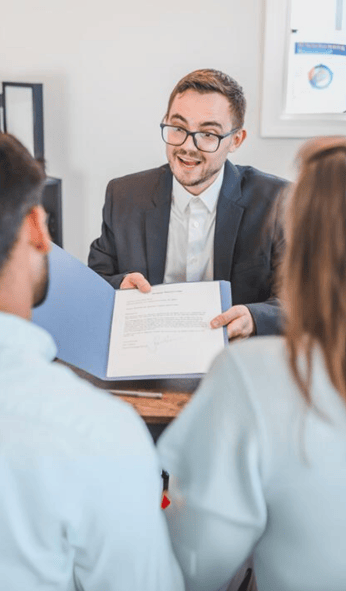It’s important to be well prepared for your first meeting with a mortgage advisor. It’s also important as a first-time buyer to understand the purpose of the meeting — which is to see if you are eligible for a mortgage and to begin reviewing potential products. Before you book a mortgage appointment, it’s sensible to make sure your prepared.
There are many documents and other types of information that would be useful to have in place in advance. Your adviser may require you to send some documents over before the first appointment. For the first mortgage appointment, the more documents you can bring along, the more productive the meeting is going to be.
The Topics Covered in this Article Are Listed Below:
What Happens During the Meeting?

At the first mortgage meeting, the advisor will ask you about your personal circumstances and expectations. They’ll want to know what sort of property you’re looking to buy and how much you can afford to spend on one. They’ll also want to review what you earn, your outgoings, your savings, and your credit history. With this information, they’ll be ready to go off and do their research before coming back to you in a follow up call.
Things to Remember for Your First Mortgage Appointment
While you may be nervous as so much is at stake, you should remember that the person on the other side of the table or phone wants to be able to offer you a decision. It’s in their benefit to begin your property search in earnest as this will help them to find the exact mortgage product that suits your needs and circumstances.
The mortgage broker is not a mortgage lender, they’re there to support your application so it’s important to be open and honest – even if it’s bad, let them know – not waste time.
If you’re applying for a mortgage with another person (your partner, or a guarantor), it’s helpful to the lender if all parties who are applying are in attendance. If you’ve booked a physical mortgage advisor appointment and someone can’t attend, they’ll need to be contactable during the appointment (over the phone or joining through video call), as the mortgage advisor is likely to need to speak with them.
What to Bring to a Mortgage Appointment
Different lenders will have their own requirements for how you submit mortgage information to them but the broker will relay this info to you. Typically, info that will be requested is the following:
- Proof of identity (photo ID), such as your passport or driving license.
- Proof of address, such as a recent utility bill or bank statement.
- Proof of income, including:
- The last 3 months of bank statements
- Employers’ details for the last 3 years (name, address, telephone number and dates you were employed there)
- The most recent 3 months of pay slips, including details of any guaranteed overtime, bonus, or commission
- Your most recent P60 tax statement (typically issued by your employer in April/May)
- If self-employed, you should bring the last 2 years tax calculations and overviews
- Your most recent annual mortgage statement if you already own a property
- Details of all your other existing outgoings, including any other loans you may have, such as car financing
- Details of any credit card debt you may have
- Full details of any county court judgements you have (or had previously), as well as details of any other arrears or defaults
- Information about life or critical illness insurance policies, home insurance, pensions, or private healthcare policies you may have, as well as any mortgage insurance policy you hold
- Your buildings insurance policy if you’re remortgaging from another lender
- If you’re applying for an interest-only mortgage, provide details of how you plan to pay back the amount you borrowed at the end of the mortgage term
- Your solicitor’s details, whether you’re buying a property or adding/removing someone from a mortgage
- If you’re purchasing, your broker would also want to know your estate agents details for the valuation
It’s also recommended that you bring along a copy of your credit report. This is easily available online for free.
Your Follow Up Call After Your First Mortgage Meeting

Once the adviser has done their research, during your second call they’ll present you with a mortgage illustration which is essentially a factsheet of all the key information about the mortgage product they’ve found that is best for you.
If you’re happy with the terms of the mortgage deal they’ve presented, your mortgage broker can then go about securing you a Decision in Principle (DIP) from the lender. A DIP simply confirms that the lender is willing to grant you the mortgage deal in question for said amount, granted all the information you provided is correct.
What Happens Next?
As soon as you’ve found a property and had your offer accepted, it’s time to apply for your mortgage. This may require another appointment with your adviser. If it’s a face-to-face meeting, it makes sense to bring along the same documents listed above, as well as details of the property you’d like to buy.
This includes the:
- Property Address
- Purchase Price
- Estate Agents Details
- Deposit
If it’s a leasehold property, the mortgage adviser will also need to know the remaining term of the lease and review the lease documentation. They’ll also want to know if there’s any ground rent or service charge.
At the meeting, the advisor will take you through the application process step-by-step and barring any unforeseen issues, you should leave the meeting with a mortgage in place.
First Mortgage Appointment Summary
Here’s a quick breakdown of what we’ve covered so you can make the most out of your first mortgage meeting.
What to bring to your first mortgage appointment:
Proof of income
Proof of assets
Credit information
Employment verification
Identification
Residential history
What to expect from your first mortgage appointment:
Discussion of financial situation
Budget assessment
Mortgage options overview
Preliminary numbers regarding borrowing and terms of the mortgage
Next steps such as presenting you with the mortgage illustration and securing a DIP
Tips for mortgage adviser appointments:
Be honest - provide accurate and complete information about your finances to avoid issues later in the process
Ask questions - don’t hesitate to ask your mortgage adviser questions regarding clarification on terms, rates, or anything else. Understanding your mortgage options thoroughly is crucial
Take notes - keep track of important information and decisions made during the meeting
Post-appointment actions:
Gather additional documentation - collect any additional documents the broker requests as quickly as possible in order to help keep your application journey moving
Start your journey to homeownership. Contact a mortgage adviser on 0330 433 2927 and arrange your first mortgage appointment.
First-Time Buyer Mortgages
Discover the best first time buyer mortgage rates available and the latest advice from John Charcol: mortgage broker for first time buyers.
Buying Your First Home
From the definition of a first-time buyer, through the steps to buying a property and the costs you’ll face - everything you need to know is in our guide.
Stamp Duty Calculator
Use our stamp duty calculator and find out how much tax you will pay when buying a main residential or secondary property in England or Northern Ireland.
First Time Buyer Costs
Learn about the different first-time buyer costs when buying property and moving house. Start your journey here with our first-time buyer costs checklist.
The Bank of Mum and Dad – How to Help Your Children Buy a Home
With many prospective buyers turning to the bank of mum and dad, learn about some of the ways parents can support their children in buying a home.
Mortgage Deposit Guide
How much deposit will you need for your mortgage? We explain how mortgage deposits work, what LTV is, how your deposit affects your mortgage and more.
House Buying Mortgage Guide
Are you looking to buy your first home? Or perhaps want to move to a new area? Our step-by-step guide will tell you everything you need to know about buying a house.
Protecting Your Home and Property
It's important to understand what protection you must have in place to buy a home and the options open to you to provide you with peace of mind.
Applying for a Mortgage
Applying for a mortgage couldn’t be simpler with our easy and simple guide from application to accepting your offer.
How Much Can I Borrow?
This mortgage calculator examines your income and works out how much money a mortgage lender might provide you with
